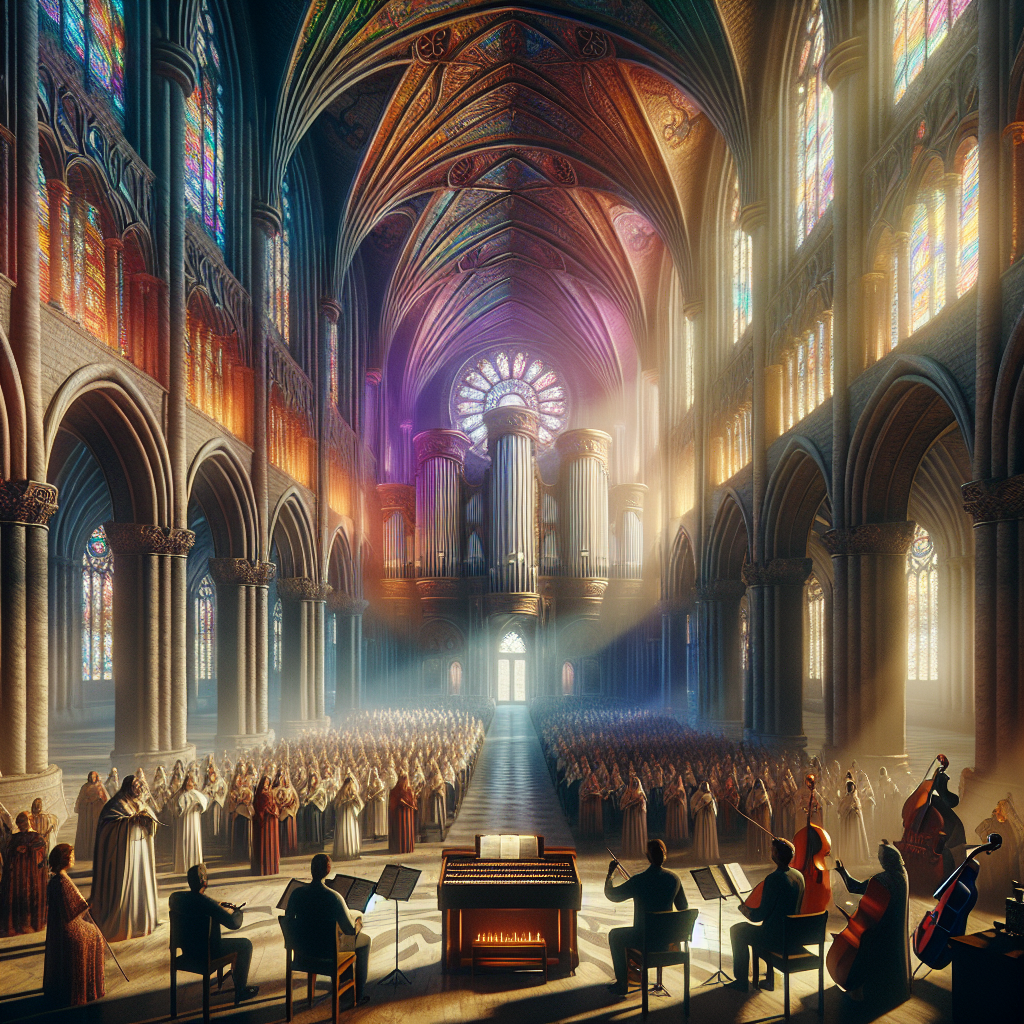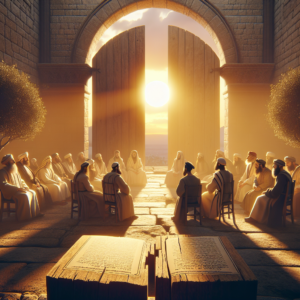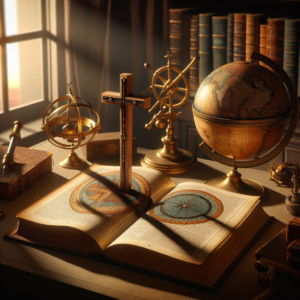Spiritual Devotional about Sacred Music
Title: The Divine Symphony: Embracing the Power of Sacred Music
Hello, beautiful souls! Today, let’s embark on a harmonious journey into the transcendent world of sacred music and explore how it vibrates with the power to elevate our spirits and draw us nearer to the divine.
Music, in its essence, is a universal language that resonates deeply within our hearts. From the rhythmic heartbeat that first greets us in the womb to the melodies that accompany the milestones of our lives, music is woven into the very fabric of our existence. But sacred music? Oh, dear friends, it’s something even more extraordinary!
Sacred music holds a special place in our lives as believers. The Scriptures reveal the profound significance of music in worship and spiritual connection. Consider King David, the "sweet singer of Israel," who famously danced before the Ark of the Covenant. With a pure heart and joyous spirit, he lifted his voice and played his harp in wholehearted devotion to God. We can glean from this example that sacred music is a vessel through which we express our deepest adoration and gratitude.
The book of Psalms is replete with examples of this divine truth. Psalm 100:1-2 delightfully encourages us: "Make a joyful noise unto the Lord, all ye lands. Serve the Lord with gladness: come before his presence with singing." What a beautiful invitation to let our music be an offering, a sacred dialogue between us and our Creator! Music allows our souls to articulate what words alone cannot suffice to convey.
Sacred music not only offers adoration but also serves as a balm for weary hearts. In moments of trial, songs steeped in faith can provide comfort and solace, reminding us of God’s steadfast love and presence. The Apostle Paul and Silas knew this well when they sang hymns in prison, despite their chains (Acts 16:25). Their songs became a witness of unshakeable faith and brought about miraculous deliverance. What a testament to the power of music inspired by divine truth!
Furthermore, sacred music has the remarkable ability to unite hearts. When voices blend in a harmonious hymn, divisions fade, and a sense of oneness emerges, reflecting the heart of Jesus’ prayer for believers: "that they may be one, as we are one" (John 17:22). Through music, we can glimpse the unity of heaven, where countless multitudes from every nation will one day gather to worship in perfect harmony around God’s throne.
As we embrace sacred music in our lives, whether through singing, playing instruments, or simply listening with open hearts, let’s do so with intentionality and joy. Let’s choose melodies and lyrics that align with God’s truth and uplift our spirits. Engage with the rich tapestry of sacred music from different cultures and traditions, allowing it to deepen your understanding and appreciation of God’s diverse creation.
Dearest friends, let the divine symphony of sacred music be a cherished companion on your spiritual journey. May its notes lift your burdens, fill your heart with joy, and draw you ever closer to the heart of God. And may the words of Psalm 150 inspire you anew: "Let everything that has breath praise the Lord. Praise the Lord!"
With love, harmony, and boundless joy,
[Your Name]
Explore and dig up answers yourself with our BGodInspired Bible Tools! Be careful – each interaction is like a new treasure hunt… you can get lost for hours 🙂
Q&A about Sacred Music
Certainly! Here is a Q&A based on the topic of Sacred Music:
Question 1: What is sacred music?
Answer: Sacred music is a genre of music that is composed for religious or spiritual purposes. It is often performed in places of worship or during religious ceremonies and can include a wide range of musical styles and traditions. This type of music is generally intended to uplift the spirit, encourage reflection, and facilitate a sense of connection with the divine or the sacred.
Question 2: How does sacred music differ from secular music?
Answer: The main difference between sacred and secular music lies in their purposes and contexts. Sacred music is created for religious or spiritual expression, often used in worship and other religious settings, whereas secular music is intended for non-religious environments and focuses on a variety of themes unrelated to spirituality. The distinction can sometimes be blurred, as music traditionally considered secular can take on sacred significance in different contexts and vice versa.
Question 3: Can you give examples of different types of sacred music across cultures?
Answer: Absolutely. In Western Christianity, Gregorian chant and hymns are traditional forms of sacred music. In the Eastern Orthodox Church, sacred music might include Byzantine chant. Jewish sacred music encompasses songs like psalms and nigunim, while Islamic traditions feature the call to prayer (adhan) and nasheeds. Hindu sacred music might involve bhajans and kirtans, and Buddhist chants such as the Heart Sutra are integral to spiritual practices.
Question 4: Who are some famous composers of sacred music?
Answer: Many renowned composers have contributed significantly to the body of sacred music. In the Western classical tradition, Johann Sebastian Bach, with works such as the Mass in B Minor and St. Matthew Passion, is highly celebrated. Wolfgang Amadeus Mozart’s "Requiem" and Antonio Vivaldi’s "Gloria" are also well-regarded. In addition, Hildegard von Bingen, a medieval composer, is recognized for her contributions to sacred chant music.
Question 5: How has sacred music evolved over time?
Answer: Sacred music has continuously evolved, reflecting and shaping the religious and cultural contexts in which it is created. Early sacred music, such as Gregorian chant, was monophonic and relatively simple, focusing on liturgical texts. As music theory advanced, so did the complexity of sacred compositions with the introduction of polyphony during the Renaissance. The Baroque period brought about elaborate compositions like oratorios and passions. In contemporary times, sacred music spans a vast array of styles, with influences from modern music genres, making it a dynamic and ever-changing form of expression.
Question 6: What role does sacred music play in modern religious practices?
Answer: In modern religious practices, sacred music continues to play a crucial role in worship and spiritual gatherings. It is used to enhance the ritual experience, foster a sense of community, and aid in meditation and prayer. Many congregations incorporate a wide variety of music styles, from traditional hymns to contemporary worship songs, allowing for diverse expressions of faith that resonate with different generations and cultures.
Feel free to ask more questions or request further information on specific aspects of sacred music!


